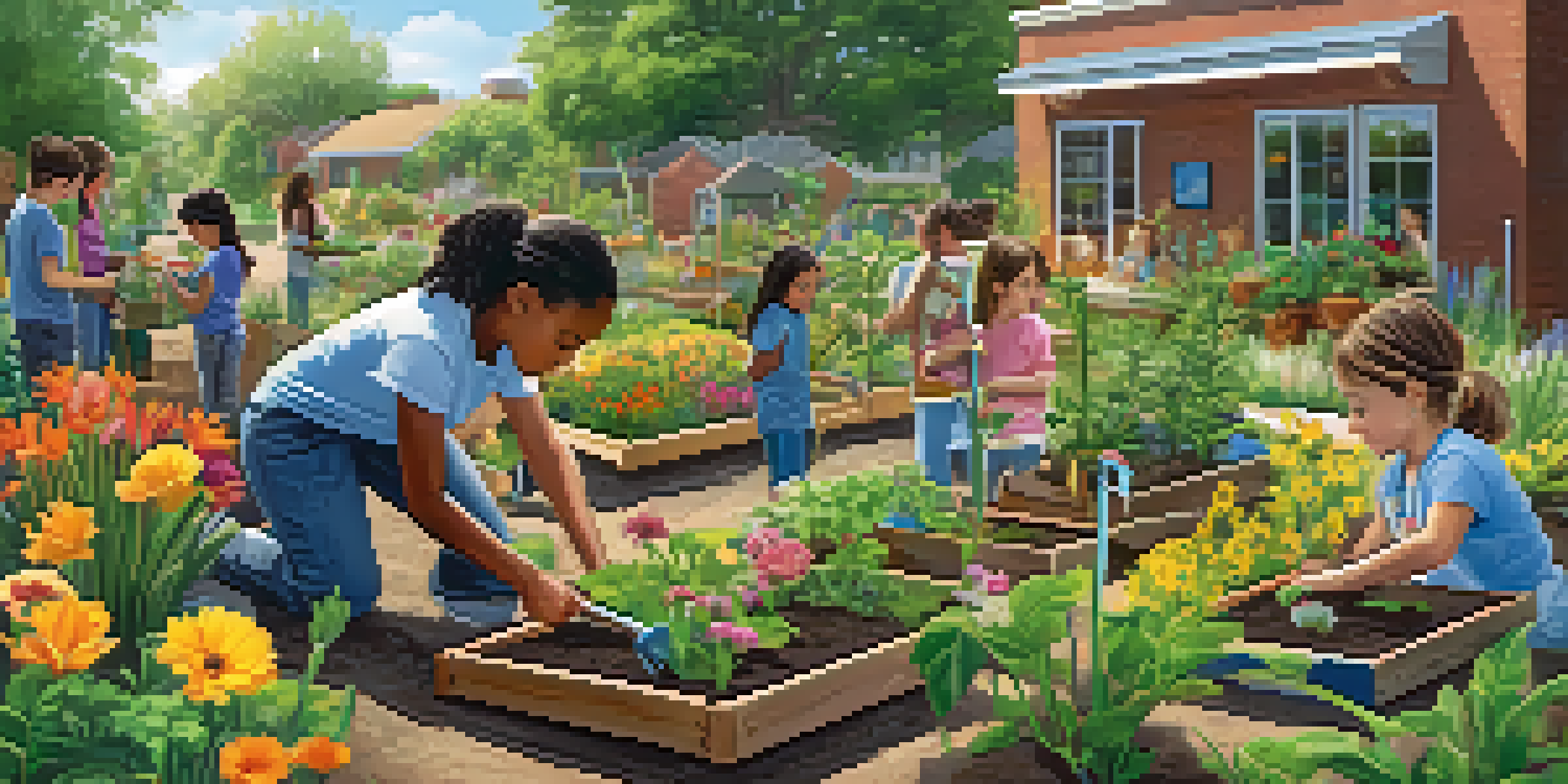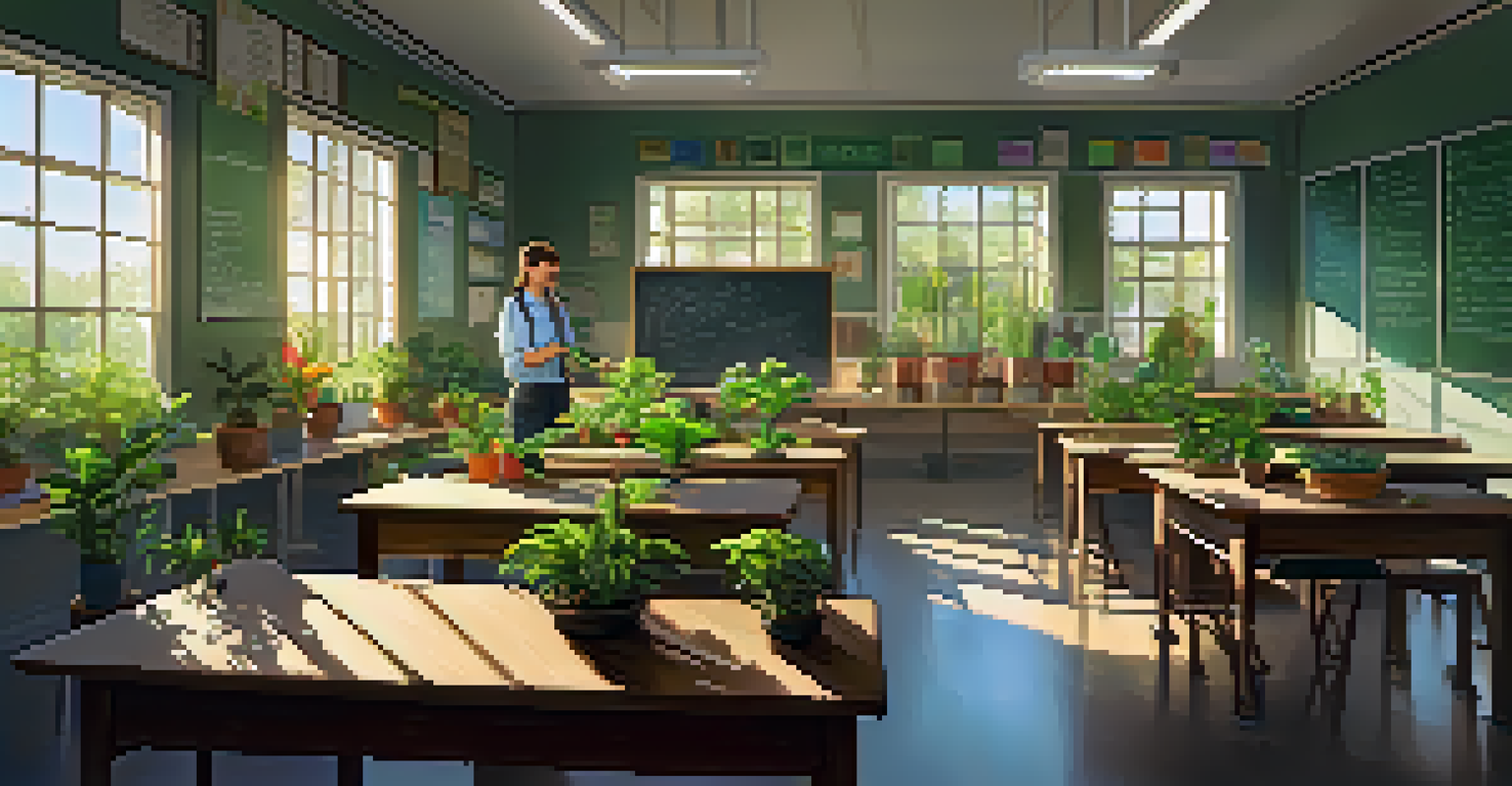The Role of Education in Promoting Plant Conservation Awareness

Understanding Plant Conservation and Its Importance
Plant conservation is crucial for maintaining biodiversity and ecological balance. It involves protecting native species and their habitats from threats like habitat loss, climate change, and invasive species. By recognizing the significance of plant conservation, we can help sustain the Earth’s ecosystems.
The greatest threat to our planet is the belief that someone else will save it.
Education plays a pivotal role in instilling this understanding among individuals. Through schools, community programs, and online resources, people can learn about the critical functions that plants serve in our environment. The more we know, the more we care, and this awareness can lead to action.
For instance, a simple lesson on the role of plants in providing oxygen and food can spark a passion for conservation in young minds. It’s about connecting the dots between education and real-world impacts, making the importance of plant conservation resonate deeply.
Integrating Plant Conservation into Curricula
Incorporating plant conservation topics into school curricula can inspire the next generation of environmental stewards. Subjects like biology, geography, and even art can include components that highlight the importance of plants and their ecosystems. This integration ensures that conservation becomes a fundamental part of education.

For example, a biology class might involve a project on local plant species, encouraging students to research and present their findings. Such hands-on experiences not only enhance learning but also foster a connection with local flora. This approach can cultivate a sense of responsibility towards the environment.
Importance of Plant Conservation
Plant conservation is essential for maintaining biodiversity and ecological balance, protecting native species from various threats.
Moreover, engaging students in outdoor activities like gardening or nature walks can reinforce classroom learning. Witnessing plant life firsthand allows students to appreciate the beauty and complexity of ecosystems, making the importance of conservation more tangible.
Community Engagement and Workshops
Community workshops and events can play a significant role in promoting plant conservation awareness. These gatherings provide opportunities for individuals to learn from experts and connect with like-minded people. They can also be platforms for sharing practical conservation techniques.
In every walk with nature one receives far more than he seeks.
For instance, a local garden club might host a workshop on native plant gardening, teaching participants how to create habitats that support local wildlife. Such initiatives not only educate but also empower individuals to take action in their own backyards. This grassroots approach can lead to significant environmental benefits.
Additionally, community events can foster a sense of shared responsibility. When people come together to learn and engage in conservation efforts, they build stronger connections and encourage one another to make a difference.
Utilizing Digital Platforms for Awareness
In today’s digital age, online platforms offer powerful tools for promoting plant conservation awareness. Social media, blogs, and educational websites can reach a vast audience, spreading knowledge and inspiring action. They serve as a bridge between educators, conservationists, and the public.
For example, an organization might launch a campaign on Instagram showcasing endangered plant species and their habitats. Sharing stunning images and compelling stories can captivate audiences and encourage them to learn more. This visual approach often resonates more than traditional methods.
Education Drives Conservation Action
Integrating plant conservation into educational curricula empowers students to become environmental stewards and advocates for sustainable practices.
Moreover, online webinars and virtual workshops have made it easier for people to access education from anywhere. This flexibility allows for broader participation, ensuring that more individuals are informed and engaged in plant conservation efforts.
The Role of Nonprofits in Education
Nonprofit organizations dedicated to conservation play a key role in education. They often develop programs and resources aimed at raising awareness about plant species and their ecological importance. By partnering with schools and communities, nonprofits can expand their reach and impact.
For instance, a nonprofit might create educational materials that teachers can use in the classroom, making it easier to incorporate plant conservation into lessons. These resources often include interactive activities that engage students and make learning fun. This collaboration can enhance the overall educational experience.
Additionally, nonprofits frequently organize field trips and hands-on conservation projects. These experiences allow participants to see the effects of their efforts firsthand, reinforcing the importance of their involvement in plant conservation.
Connecting Education with Policy and Action
Education is not just about awareness; it’s also about inspiring action and influencing policy. When individuals are educated about plant conservation, they are more likely to advocate for policies that protect ecosystems. This connection between knowledge and action is vital for effective conservation efforts.
For example, students who learn about the detrimental effects of deforestation may become advocates for sustainable practices in their communities. They can engage in initiatives like tree planting or support local legislation aimed at preserving natural habitats. This proactive approach can lead to meaningful change.
Community Engagement Enhances Awareness
Community workshops and events foster connections and inspire individuals to take practical actions towards plant conservation.
Moreover, educated individuals can contribute to research and conservation projects, providing valuable insights that inform policy decisions. Their involvement helps bridge the gap between education and real-world applications, showcasing the power of informed citizens in shaping environmental policies.
Challenges in Promoting Plant Conservation Awareness
Despite the benefits of education in promoting plant conservation awareness, challenges remain. Misconceptions about conservation practices can hinder progress, leading to apathy or resistance. It’s essential to address these challenges through clear and accurate information.
For instance, some individuals may believe that conservation efforts are too costly or time-consuming. By providing education on the benefits and feasibility of conservation practices, we can dispel these myths. It’s about making conservation accessible and showing that everyone can contribute.

Additionally, reaching diverse audiences can be a challenge. Tailoring educational content to resonate with different communities is crucial for widespread engagement. This inclusivity ensures that plant conservation awareness reaches all corners of society, fostering a collective effort towards sustainability.
The Future of Education and Plant Conservation
Looking ahead, the future of education in promoting plant conservation awareness is promising. As technology advances, new educational tools and platforms will emerge, making learning more engaging and accessible. This evolution will enhance our ability to reach and educate diverse audiences.
Moreover, there is a growing recognition of the interconnectedness of environmental issues. Education that encompasses climate change, biodiversity, and conservation will become increasingly important. This holistic approach can foster a deeper understanding of the role plants play in our ecosystems.
Ultimately, by prioritizing education in plant conservation, we can empower individuals to become advocates for change. The knowledge gained today can lead to a more sustainable future, where people actively participate in preserving the planet’s precious plant life.